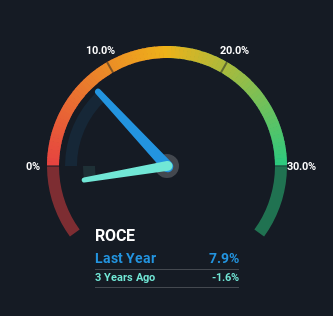- India
- /
- Hospitality
- /
- NSEI:ASIANHOTNR
Asian Hotels (North) (NSE:ASIANHOTNR) Is Experiencing Growth In Returns On Capital

To find a multi-bagger stock, what are the underlying trends we should look for in a business? Firstly, we'd want to identify a growing return on capital employed (ROCE) and then alongside that, an ever-increasing base of capital employed. This shows us that it's a compounding machine, able to continually reinvest its earnings back into the business and generate higher returns. Speaking of which, we noticed some great changes in Asian Hotels (North)'s (NSE:ASIANHOTNR) returns on capital, so let's have a look.
Return On Capital Employed (ROCE): What Is It?
For those that aren't sure what ROCE is, it measures the amount of pre-tax profits a company can generate from the capital employed in its business. Analysts use this formula to calculate it for Asian Hotels (North):
Return on Capital Employed = Earnings Before Interest and Tax (EBIT) ÷ (Total Assets - Current Liabilities)
0.079 = ₹690m ÷ (₹17b - ₹8.1b) (Based on the trailing twelve months to December 2023).
Thus, Asian Hotels (North) has an ROCE of 7.9%. Ultimately, that's a low return and it under-performs the Hospitality industry average of 11%.
See our latest analysis for Asian Hotels (North)

While the past is not representative of the future, it can be helpful to know how a company has performed historically, which is why we have this chart above. If you want to delve into the historical earnings , check out these free graphs detailing revenue and cash flow performance of Asian Hotels (North).
What The Trend Of ROCE Can Tell Us
You'd find it hard not to be impressed with the ROCE trend at Asian Hotels (North). We found that the returns on capital employed over the last five years have risen by 118%. The company is now earning ₹0.08 per dollar of capital employed. Speaking of capital employed, the company is actually utilizing 51% less than it was five years ago, which can be indicative of a business that's improving its efficiency. If this trend continues, the business might be getting more efficient but it's shrinking in terms of total assets.
On a side note, we noticed that the improvement in ROCE appears to be partly fueled by an increase in current liabilities. The current liabilities has increased to 48% of total assets, so the business is now more funded by the likes of its suppliers or short-term creditors. Given it's pretty high ratio, we'd remind investors that having current liabilities at those levels can bring about some risks in certain businesses.
The Bottom Line
From what we've seen above, Asian Hotels (North) has managed to increase it's returns on capital all the while reducing it's capital base. Since the total return from the stock has been almost flat over the last five years, there might be an opportunity here if the valuation looks good. That being the case, research into the company's current valuation metrics and future prospects seems fitting.
Asian Hotels (North) does have some risks, we noticed 2 warning signs (and 1 which doesn't sit too well with us) we think you should know about.
While Asian Hotels (North) isn't earning the highest return, check out this free list of companies that are earning high returns on equity with solid balance sheets.
New: Manage All Your Stock Portfolios in One Place
We've created the ultimate portfolio companion for stock investors, and it's free.
• Connect an unlimited number of Portfolios and see your total in one currency
• Be alerted to new Warning Signs or Risks via email or mobile
• Track the Fair Value of your stocks
Have feedback on this article? Concerned about the content? Get in touch with us directly. Alternatively, email editorial-team (at) simplywallst.com.
This article by Simply Wall St is general in nature. We provide commentary based on historical data and analyst forecasts only using an unbiased methodology and our articles are not intended to be financial advice. It does not constitute a recommendation to buy or sell any stock, and does not take account of your objectives, or your financial situation. We aim to bring you long-term focused analysis driven by fundamental data. Note that our analysis may not factor in the latest price-sensitive company announcements or qualitative material. Simply Wall St has no position in any stocks mentioned.
About NSEI:ASIANHOTNR
Slightly overvalued with imperfect balance sheet.
Similar Companies
Market Insights
Community Narratives




